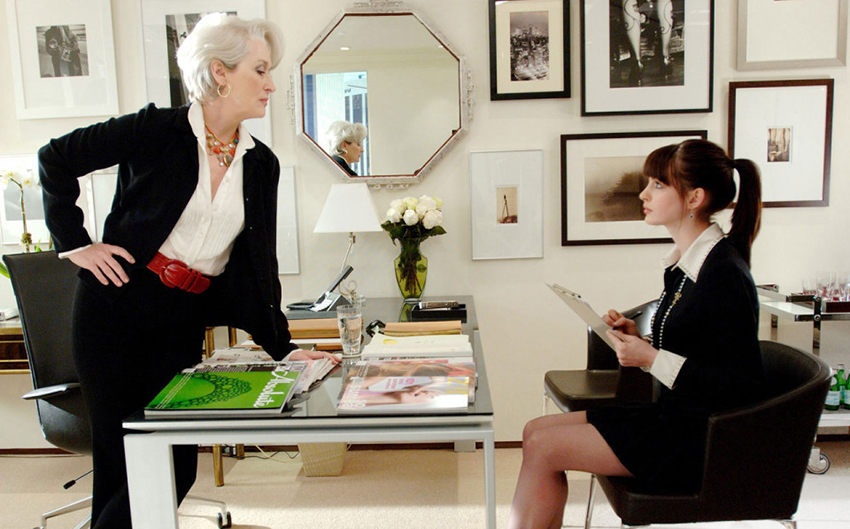These people are physically as close to the world of high fashion as possible, but for the largest majority (including the bosses!) their work frequently stays behind the scenes, being uncertain and even unfairly useless. Day and night they’re making sure the bosses don’t have a headache because of all sorts of household stuff: coffee should always be hot, the clothes has to be clean and ironed, the tablet and the smartphone to be charged – it’s a must, and all the necessary things are to be within one’s hand reach… All these endless tasks on the one hand are so trivial that it tends to create a sense of “invisibility”, but on the other hand they are so vitally important and necessary which actually makes this job extremely demanding. Perhaps if there was no bestseller published in 2003 and later the movie based on this book – then we could possibly stay forever guessing on who takes care of the fashion industry’s life sustaining. It is easy to guess that the thing is about personal assistants and the sensational novel “The Devil Wears Prada”. As you all remember, according to the plot of the book a young provincial girl named Andrea Sachs, who has just graduated from college and wanted to get a job as a magazine writer, applied for the position of the Junior Assistant at the America’s most prestigious fashion magazine “Runway”. We will not be making a spoiler for those who have not read the book and have not seen the movie itself (the end of the book is different though, so we do recommend it) and we are not going to describe all the twists, turns and intrigues, that seem quite realistic amid eccentric, sarcastic, and occasionally mocking requests that Miranda Priestly gives to her assistant. As the matter of fact, these very assignments are the bitter truth of daily routine that all personal assistants and designers have to face.
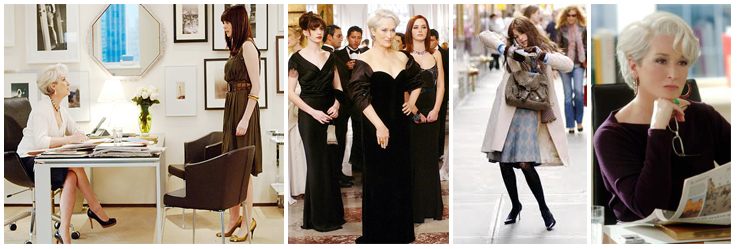
But the story would have remained another Hollywood melodrama, if not those quite realistic prototypes of the main characters. The author of the book, Lauren Weisberger, has been working for ten months as a personal assistant to Anna Wintour — the editor-in-chief at Vogue US. After she ended up disappointed and tired of the hard nature and perfectionism of her boss, she resigned, but the impressions were too strong to just fade away.
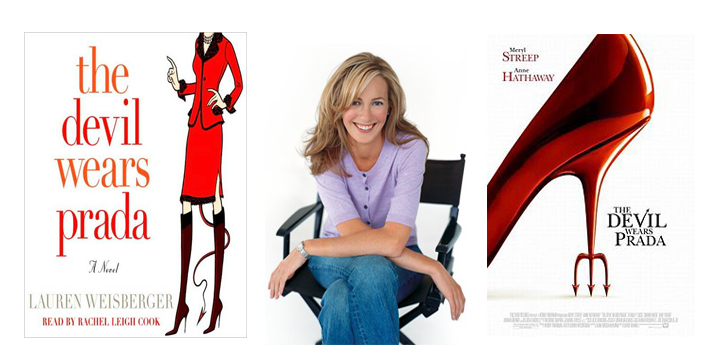
Since the book has been released, many critics and mass media began to talk about striking resemblance of Miranda Priestly and Anna Wintour (and this similarity has been noticed not only in her passion to Prada), as well as the resemblance of the fictional publishing house Elias-Clark and the well-known and legendary Condé Nast. Numerous articles and interviews with Lauren Weisberger, the silence from the side of Vogue magazine, and the criticism from Kate Betts – the former employee of the magazine – it all showed that despite the fact that the story surely had some portion of fiction it was still a true reflection of all margins, snobbery, betrayal, tyranny and “walking over the head” methods. It is significant that the documentary ‘The September Issue’ introduced Anna Wintour in a completely different light despite Miranda Priestly character — a rigorous and critical, but always balanced and fair woman, whose doors are open for all employees. In this mixture of a naked truth, literary fiction and a personal grievance (such a “must-have” list of every former celebrity’s personal assistant) it is still sort of a challenge to find the verity. Due to this statement it will better to hear the point of view of the main figure of the whole “process” — Anna Wintour. In one of the interviews of 2011 she answered to the question about the relationship with her assistants, and the similarity with the character that Lauren Weisberger created: “I will comment on this shortly. It’s true that I let all kinds of physical abuse against my personal assistants, and also I lock them in the office, do not let the fresh air in and do not pay them salaries (ironically smiling). And I’ll tell you even more: I have a family and friends in my life, and they really mean a lot to me. I would do everything for these people. Work will always be work. It raises absolutely different problems and relations within the team get a slightly different shade”. Such stories are rather exceptions, and in most of the cases editors’ assistants always remain in the shadow of their brilliant and super powerful bosses. The average assistant of the editor in Vogue magazine is a young girl who’s just graduated from some good college, most likely without any experience in this field, with an ambitious goal to build a successful career in the fashion industry and to take the place of her boss (as Anna Wintour did it once). According to the practice most of such assistants do not even keep their position for longer than a year: some can’t stand the stress, some get disappointed, and some of them move forward and climb up the career ladder, or pick some more prestigious position in a different publication (no need to highlight the fact they are kindly welcome!). Despite the importance of their functions and the residence at Olympus of fashion industry, personal assistants in rare exceptions can’t use their position’s priorities and to bask in the glory of their famous chiefs. For most of them, all their “publicity” is limited by accidentally taken shots next to the boss or reference on the last page of the magazine’s issue. But actually this is not the main aim. First of all they chase the invaluable experience and business contacts, and of course the related line in their CV. Although, some lucky ones get nice bonuses as well…
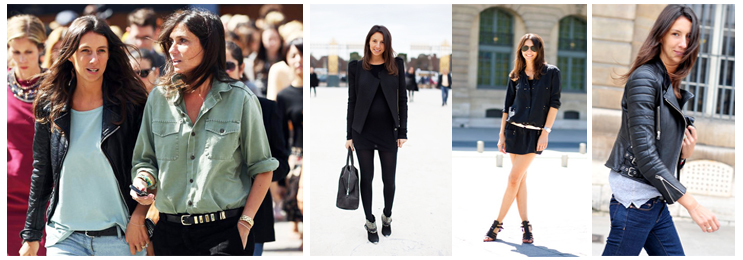
Geraldine Saglio is the assistant and a part-time stylist for Emmanuelle Alt, the editor-in-chief at Vogue Paris. The girl has been holding this position since 2004, and we must admit her profession skills and duties go way out of the frame of common personal assistant, in fact she is rather being a friend, counselor and adviser all in one. Geraldine accompanies Emmanuelle Alt almost at all the fashion shows and events, and from the behind they are too hard to tell apart: both tall, slender, always in high heels and dressed pretty much identically.
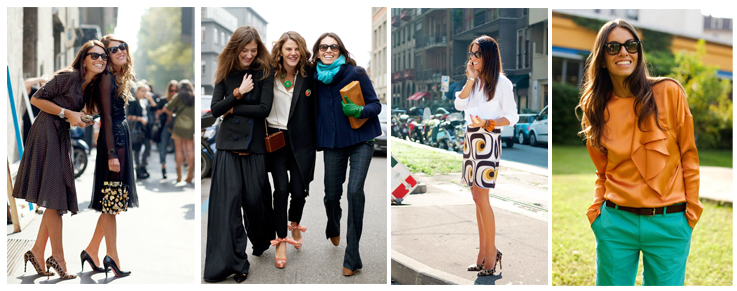
Viviana Volpicella is another example of someone more than just an assistant, or rather the right hand of Anna Dello Russo. This girl with a stunning smile and the same red nail polish is a part of the Italian team of Dello Russo at Vogue Nippon.

Young assistant of Anna Wintour, Adriel Saporta, got positively distinguished from her predecessors and even made it to Vogue’s pages, as well as many different fashion-blogs, all due to her unusual sense of style and ability to magically combine the items.
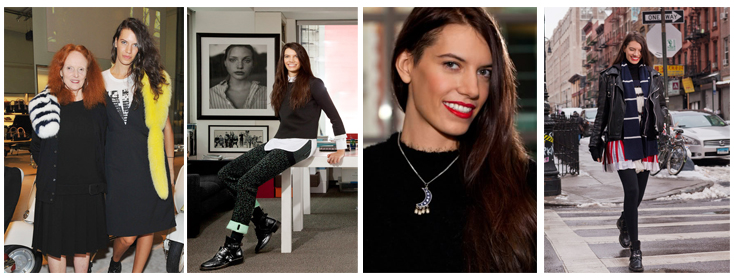
Stella Greenspan is a current assistant for Grace Coddington, she accompanies the creative director of Vogue US almost everywhere. Same as the assistant of Anna Wintour, this girl is also young, stylish and ambitious. Even ambitious enough to… allow herself to get rid of all the letters from many other girls desired to apply for her position. An interesting and valuable fact though!
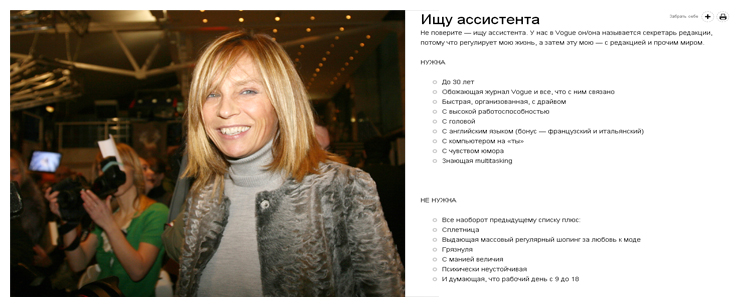
By the way, Grace Coddington once unfolded to ‘Teen Vogue’ all of her initial demands to the personal assistant: “My assistant should have a good sense of humor, and it has to be someone who will not go home early in the evening. I never ask questions about their education and things like that. Maybe it’s wrong, but it really does not interest me. I like to just sit down and talk to them watching the reaction”. As you can see, it’s pretty simple. There is only one strange but necessary and obligatory condition — Grace Coddington’s assistant must love cats.
And here are the requirements for a personal assistant of Alena Doletskaya, the former editor-in-chief at Vogue Russia.
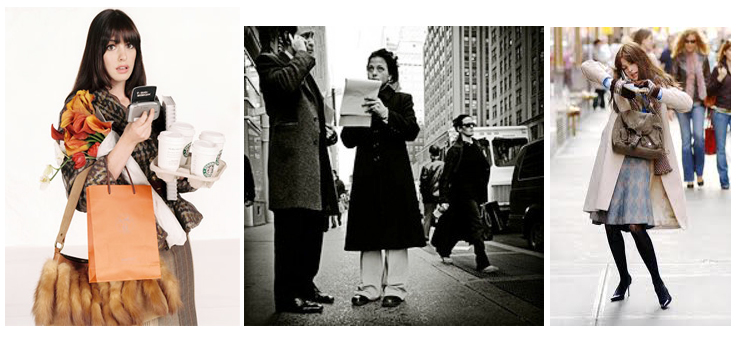
Needed:
– Under 30 years old;
– Worshiping Vogue magazine and all that is associated with it;
– Fast, organized, with a drive;
– With a high capacity for work;
– With the head on her shoulders;
– Should speak English (bonus – French and Italian);
– Knows computer well;
– With a sense of humor;
– With ability of multitasking.
Not needed:
The opposite to the foregoing list and also:
– Gossip girl;
– Fond of a massive regular shopping giving it out as a love to fashion;
– Untidy;
– With delusion of grandeur;
– Mentally unstable;
– And the one who’s looking for 9-18 working day.
Generally, the requirements are similar but let’s see the list of the needed qualities for the Fashion Director’s personal assistant at NET-A-PORTER: • Clear understanding of the fashion industry and experience of work in the luxury-segment; • Experience of work with senior management; • Ability to plan international travel at the last minute; • Knowledge of MS Office package; • Excellent communication skills – verbal and written; • Peace of mind and stress resistance; • Ability to work with the confidential information; • Ability to work hard and effectively; • Ability to work under tight deadlines and extreme pressure of changing conditions; • Initiative; • Self-confident to be able to maintain contact with top-ranking people within the company and not only; • Attentive to details. As you can see, everything is real and nothing is impossible! If you feel the strength and desire, just follow these ten practical tips and you will definitely reach your goals then! 1. Stay patient and be prepared to start from the lowest rungs of career ladder. Be helpful and humble, display the talents and abilities as needed. 2. Be sure to append a summary of any information that can be useful for you. Maybe you are perfectly aware of MS Office or have already planned more than a dozen of trips (even if only for yourself or friends), grew up in a large family and therefore have elevated stress tolerance or as maybe you attended sewing course when you were a kid. All these skills are highly valued by employers. 3. At the initial stage, no one needs you be creative, but just execute the basic “technical” duties. Save your ideas for later. 4. Apply for an internship at the designers’. This work is often not being paid but it will show off new career opportunities to you. 5. Demonstrate responsibility and reliability while holding an intern’s position. Fashion — is not just glamor and parties but also work that requires seriousness and diligence. 6. Take some additional tasks in a complex project of a limited time so that you could show your work ethic. 7. After six months of unpaid internship try to discuss the future of your work with your boss: start with a description of your success and vision, then tangentially mention the question of a salary but do not insist, ask your boss to consider a proposal during one or two weeks. 8. Be patient and persistent — the competition will not be easy and it may take some time before you get a response to your CV and an invitation for an interview. 9. Be punctual and professional at the interview. Pick some business casual look, demonstrate the ability to combine accessories and shoes. 10. Do not be afraid to ask questions, and always learn.

